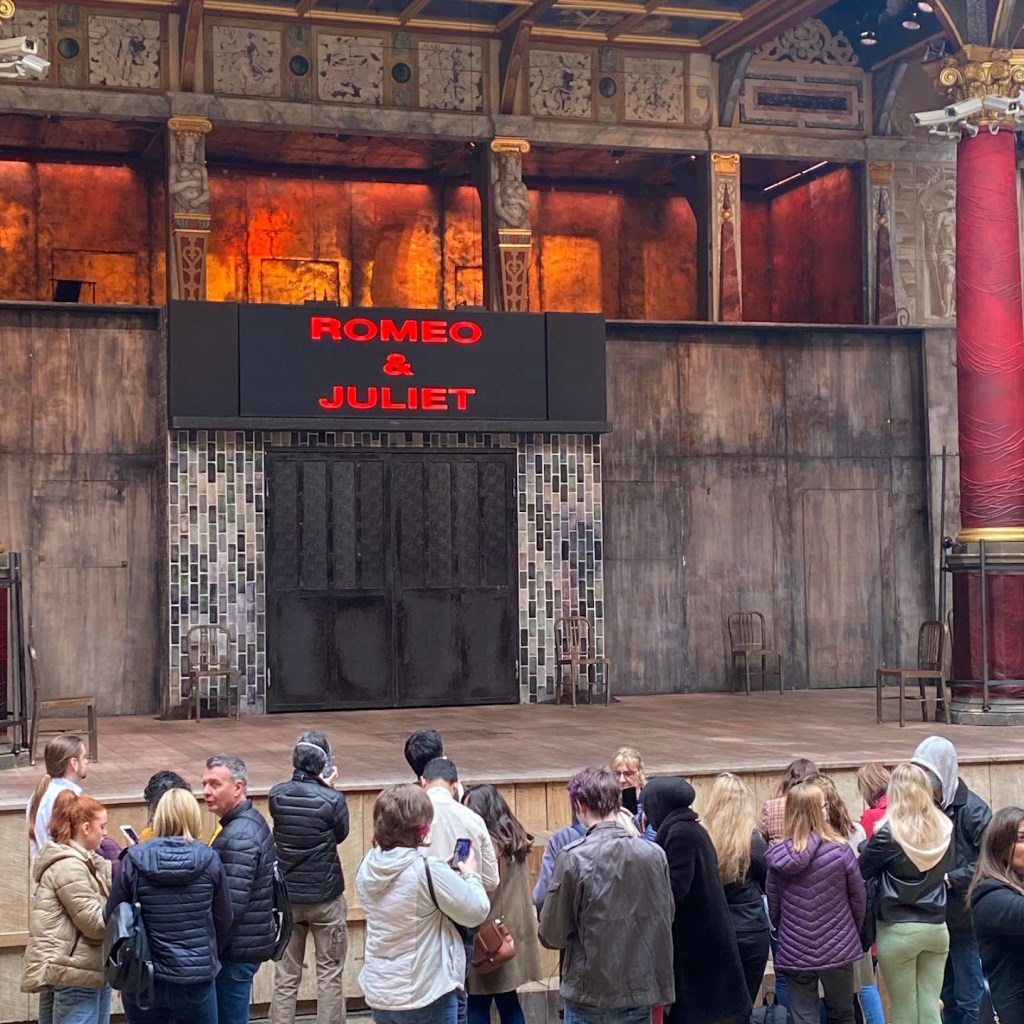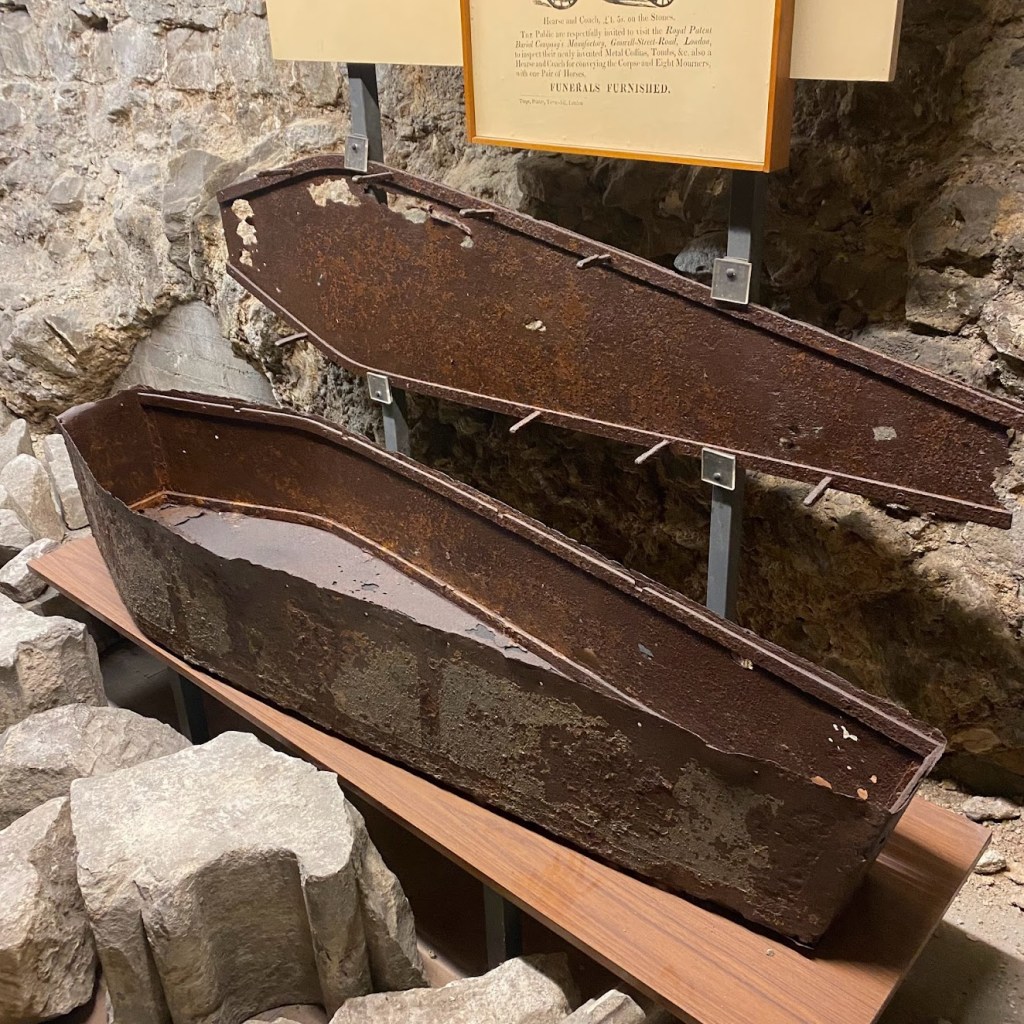Ovid’s Metamorphosis was playing at the Sam Wanamaker Playhouse. The theater is a recreation of the Jacobean-era Blackfriars Theatre. Unlike the open-air Globe, this playhouse is fully enclosed and the claustrophobic intimacy of it was apparent at once in the nearness of bodies; the actors, the members of the masked audience, the inescapable physicality of the experience. A man in our row swayed and nearly fainted in the heat. An actor on the stage called out to him in the midst of a monologue, telling him to step out and take care of himself. The narrative resumed and we did not pretend, not us on the stage and not us in the stands, that there was an invisible wall between us. Lit candelabra slipped down from the ceiling to be sparked and snuffed. Through the smoke and the warm flamelight, we heard the stories of women who became birds, became trees, escaped the heat and the swoon in any way that they could.
Romeo and Juliet was playing at the Globe. The play went up with bubbles out of the orchestra and came down in fluttering wedding confetti; there wasn’t a dry eye in the house. I was a little starstruck and heartsick when I hit the weathered cobblestones out on the avenue that runs along the Thames, and I tripped and fell in the street just as the avid crowd poured out the theater’s doors.
Falling as an adult is an exercise in indignity and profuse swearing. Doing it in a foreign country is doubly so; everyone who attempts to render aid knows by your accent on four-letter words and your insistence that you’re really fine, that you’re out of your element in more ways than just gravity. I went down alone and came up with help from strangers with London and Essex accents, the same tear-tracks on their faces as I had. I was fine. I walked along the river down toward Fleet Street. I didn’t realize I was bleeding until I reached the church.
St. Bride’s is a Christopher Wren creation; a tiered and teetering steeple tucked back behind a little churchyard on a level where the street once was (1672) but isn’t anymore. The layers of the church are deceptively simple: hushed narthex and long processional nave toward a wooden altar and a loft for the choir. The historical markers explain: the baptism of Pepys, the Great Fire of London. The blitz broke the church open to reveal what was beneath.
The stairs are around the back, narrow and curved into the earth. The posters are brags and begs by turns— fund our new roof and admire our depths! The turns lead down and down and the damage is marked on the walls. Here’s the burn, here’s the bomb. Here’s where we thought the church began, and here’s what was always below. A charcuterie of tombstones and iron coffins, laid out so that you cannot help but memento your own mori. On the lowest level, the exposed stonework is labeled. Here were the Romans, here’s a piece of the old street. Here’s when we’re sure the Anglo Saxons were here.
Above was all green and gold, a pretense at Irishness out of deference to the saint whose name she wears. At the bottom, everything washes out with the water of the old well. No signs and no words, the oldest chapel is a hollow half-circle with a clear glass altar that bears no idol and no sign. Beside that, a naked stone slab with a candle that never goes out and a Brighid’s cross in brazen wicker.
There beneath one of the oldest churches in London, I felt something I’ve only felt a few times in my life. It’s the Presence with a capital P, it’s the breath of a crocodile on the back of my neck and every little mammalian hair standing up and demanding I pay all attention to the terror and awe of the moment, because there is Something with me that I cannot trust.
I was seized with the absolute knowledge that I needed to leave an offering, and I had nothing on me. No coins for the box upstairs and nothing worked by my own hands for the stones below. A whisper wasn’t going to cut it; I needed to leave something real behind. I lifted my hands to rip out a few strands of my hair to braid and tuck into a slit between the stones. As I did, my bleeding elbow dripped down onto the middle finger of my left hand and spattered the slab. The red was black in the candlelight and I almost reached out to wipe it off. After a moment, I knew it was right. A place like that always demands what it deserves.
I came back up the stairs and left the wedding cake church behind. Well, most of me did.




